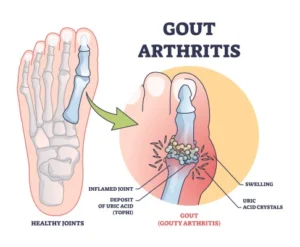
Managing Chronic Gout: Beyond Medication
Chronic gout is not just an occasional painful flare; it is a long-term condition that can damage joints, affect mobility, and reduce overall quality of life. At ACRC Trials, we believe that while medication is important, effectively managing chronic gout requires a combination of lifestyle changes, support, and access to advanced care. This blog will explore chronic gout, what triggers it, how to manage it beyond medication, and when it may be time to consider clinical trials.
What Is Chronic Gout?
 Chronic gout is a type of inflammatory arthritis that occurs due to a buildup of uric acid crystals in the joints. Over time, repeated flare-ups can result in joint damage and the formation of tophi—hard, chalky deposits that develop under the skin. Unlike acute gout, which presents with sudden episodes, chronic gout involves ongoing symptoms that may not completely go away.
Chronic gout is a type of inflammatory arthritis that occurs due to a buildup of uric acid crystals in the joints. Over time, repeated flare-ups can result in joint damage and the formation of tophi—hard, chalky deposits that develop under the skin. Unlike acute gout, which presents with sudden episodes, chronic gout involves ongoing symptoms that may not completely go away.
To better understand the causes and symptoms of gout, it is important to recognize early warning signs such as persistent joint pain, stiffness, and visible lumps (tophi) near the joints.
What Are the Symptoms of Chronic Gout?
Common signs include:
- Frequent or lingering joint pain
- Swelling, redness, and warmth in affected joints
- Limited range of motion
- The appearance of tophi—firm lumps typically on fingers, toes, elbows, or ears
If left unmanaged, chronic gout can cause irreversible joint damage and significantly interfere with daily activities.
What Aggravates Gout the Most?
 Several triggers can worsen gout symptoms and increase the risk of flare-ups:
Several triggers can worsen gout symptoms and increase the risk of flare-ups:
- High-purine foods (e.g., red meat, shellfish, organ meats)
- Alcohol, especially beer
- Sugary drinks, particularly those with high fructose corn syrup
- Dehydration, which concentrates uric acid in the blood
- Stress, illness, or sudden dietary changes
Being aware of these triggers and making small lifestyle changes can help reduce the frequency and severity of symptoms.
How Do You Get Rid of Chronic Gout?
There’s no one-size-fits-all cure, but chronic gout can be managed and its effects reduced with a combination of approaches:
- Medications – Uric acid-lowering drugs and anti-inflammatory medications are often prescribed, but some patients need more targeted solutions.
- Diet and Lifestyle Adjustments – Eating a low-purine diet, staying hydrated, maintaining a healthy weight, and exercising regularly can make a big difference.
- Ongoing Medical Monitoring – Working with healthcare providers to track uric acid levels and make personalized treatment adjustments is key.
- Clinical Trials – Clinical research offers hope for those with chronic tophi or limited success with traditional treatments.
At ACRC Trials, we’re enrolling qualified participants in the REDUCE-1 clinical trial for chronic gout. This study focuses on reducing the burden of tophi and evaluating new therapies for people who continue to experience symptoms despite standard care.
A Holistic Approach to Living with Gout
Chronic gout affects more than just the joints—it can impact sleep, movement, and mental health. That’s why managing it requires a holistic view:
- Mental Health Support: Living with chronic pain can take an emotional toll. Counseling or support groups can help.
- Mobility Aids: For advanced cases, joint supports or assistive devices may improve quality of life.
- Patient Education: Understanding the condition leads to better self-management and fewer surprises.
Hope for Chronic Gout: A Path to Relief Through Lifestyle, Treatment, and Research
 Living with chronic gout doesn’t have to mean living in constant pain. By combining medication with lifestyle changes and exploring emerging treatments, patients can take meaningful steps toward relief.
Living with chronic gout doesn’t have to mean living in constant pain. By combining medication with lifestyle changes and exploring emerging treatments, patients can take meaningful steps toward relief.
If you or a loved one is struggling with chronic gout, especially with visible tophi, consider joining the REDUCE-1 study at ACRC Trials. Clinical trials not only help shape the future of treatment, but they may also provide the breakthrough you’ve been waiting for.

